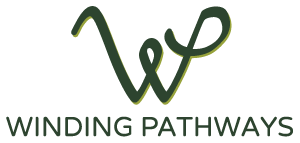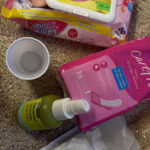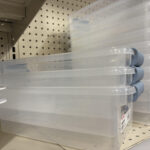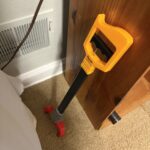Caveat
Note, many of these ideas can apply to various situations where one is temporarily limited in movement. Rich has had hand and cataract surgeries. His movements were limited for a time.
My situation was ALIF – low back fusion surgery. There appear to be different levels of this. Below are simply perspectives tactics that I have found helpful.
Take what you find useful. Leave behind anything else.
Above all: Check with your medical team on the efficacy of incorporating any thoughts below. i.e. Primary, surgeon, massage therapist, chiropractor, physical or occupational therapist.
Pre-Surgery:
Get in shape: Lose weight if appropriate. If your doctor advises this: DO IT! Strengthen the muscles you will need to help you move—your legs, arms, and abdomen. Learn to walk in structurally appropriate ways. i.e. Lift toes then step heel-toe. Draw the low belly up. Shoulders back. Chin parallel to ground. If you are using a walker or cane, use it as a guide by gripping it lightly. Use peripheral vision. Face directly whatever you are doing. For example. If you are doing dishes and need something from the countertop, take small steps and face the object you need. This vs. twist and reach for. Practice helps avoid future strain on the affected surgical area.
All this is “code talk” for: Stop shuffling! Stop slouching! Suck your gut in! Stand up straight! Release the death grip on the walker or cane! Pay attention to what is around you.
Practice: standing and sitting up straight.
Practice: upper body strength. Keep shoulders back and arms strong.
Practice: on off chairs, into out of cars.
Practice: weeks ahead: Nose follows toes. Take baby steps vs twist around. Practice: bending from knees vs waist. Realize thighs will initially be sore anyway. As desired, use a topical like “bio freeze.”
Practice: help putting on and taking off compression socks. In my case NO bending from waist or bringing knees above hips for several weeks. It’s tricky to do this. You and your helper will get better over time.
Watch and Practice: Credible YouTube videos. Movement, getting into and out of vehicles. (A great tip was to get a heavy plastic bag that is slippery to help you turn more easily.) Getting up and down off chairs. Into and out of bed. Wrestling with blankets. Using pillows between legs. Bathing. Using toilet/wiping bottom. A flaw with the videos is the occupational or physical therapist is often young, using a bed with no blankets and has not had surgery. You will need to practice ahead to manage well after surgery.
Determine the items you will need ahead.
This site is valuable for deciding what and how to get ready.
Many items you need only temporarily, so there is NO need to buy them. Ask friends if they have items to borrow. Find and use the medical tool lending libraries in your area. Label where items come from (friend, medical tool library). Place where you will need them. Grace Episcopal Church in Cedar Rapids, IA, has an amazing medical tool lending library. Say “thanks” by making a contribution and donating items when you are done.
Some items might be Walkers. Reachers. Canes. Wipes. Wedges for semi-reclining. Grippers for tub safety. Bath stools. Beds and mattresses. Small plastic box to put items in that you need when resting. (lip balm, cheater glasses. phone, hand lotion. Pen/paper. Book.)
- Gather these ahead.
- Keep organized
- Kid’s reacher
Buy disposable items you will need:
Examples are bathing and child body wipes. Clothes easy to put on and off. (i.e. wide legged pants and button-down shirts.) Use Goodwill or other resale shops to save money. Then, donate back when you no longer need these.
Declutter.
Remove unused items and trip hazards. (rugs, objects, pet toys) Get ice and heat packs ready. Check with doctor for when to start using. To avoid caffeine headache, wean off caffeine. Drink healthy liquids and use the restroom. (hot/warm water or tea. Juices. Milk)
Buy and Plug in night lights
Locate the strategic places to help with navigation.
Arrange food for several weeks.
A “Meal Train” type system helps! Schedule for every few days. Most people bring more food than for one meal. Also, you may have less appetite for a few weeks so one meal may go a ways. We found extending this courtesy longer than we initially thought, helped. If someone gives a gift card through an online site, ask them to alert you so you can find it. Look in spam. Otherwise, it will get lost.
Keep a list of people who offer to and have helped. Send notes of thanks. Ecards, real cards, texts.
Gather “entertainment” items:
Realize you may be disinterested initially. When people offer items ask if they want them back or not. If so, be sure they label them so you can return them. Small puzzles, word-type puzzles, books (audio/hard copy).
Make a document of how you like things done.
Ask people to help keep the house tidy. Include the location of cleaning items, bedding, laundry, temperature control, food, dishes/pots/pans. Contacts.
Ask another person, as well as your caregiver, to come to pre-surgery visits with you. The flood of information is overwhelming. These people can listen and understand more than you can.
Personal Care Just Before Surgery
Either wash or have you hair washed and styled immediately before surgery. I could run a brush through my hair and felt half decent for several days. Then I could use the dry wash product on my hair a few times before i was ready to tackle washing hair in the shower. Also, clip your toenails and fingernails right before. I was not to bend beyond 90 degrees – sitting L shape – for at least eight weeks. Toenails can grow really long in that time!
Practice:
When we are more present and aware, we can be more mindful, do meditation, and feel appreciations. Take a few minutes each day to say, Thank you. Breathe deeply. Smile. Release muscles. I programmed HeartMath’s Inner Balance on my phone to chime three times a day. I would pause and breathe in regenerative feelings like calm and appreciation. I’d smile as I remembered how good the sun felt on my face when sitting in the nook; the sound of robins returning; our chickens laying fresh eggs; the song birds at the feeder; a fun note from a friend; a friend’s kindness.
You have prepared yourself and those close to you. Know all will be well.





Terrific article! Very helpful!
Thank you.